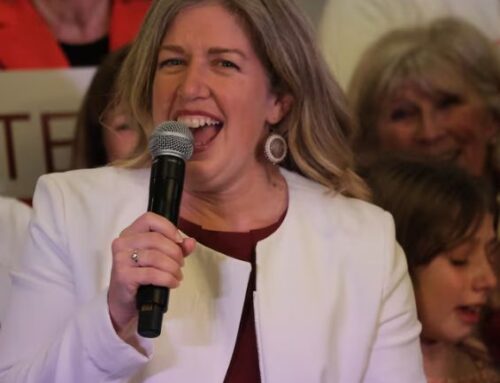Canadian abortionists respond to covid-19
On March 18, Global Newsreported on how various work environments were impacted by the coronavirus; one was a Toronto abortuary. Jane Gerster reported on the “seemingly never-ending list of cancellations and closures,” noting that “The situation changes almost hourly.” She sought out human interest stories on how the widespread closure “is already changing people’s lives nationwide,” including “a microbiologist, a call centre agent, a school custodian, abortion providers, kids’ counsellors and an inmate.” She talked to one microbiologist, one call center agent, one school custodian, and one inmate, but Gerster talked to four sources from facilities that commit abortions: Clare Hacksel, executive director of Choice in Health Clinic in Toronto; Katherine Ragsdale, president of the U.S.-based National Abortion Federation, and unnamed spokesmen for the Athena Health Centre in St. John’s, Newfoundland and Women’s College Hospital in Toronto. Gerster reported that at Choice in Health, staff made the “heartbreaking decision” (the reporter’s words) to no longer allow women seeking abortions to bring along a support person. Hacksel added that “We do not see abortion services as elective … They are an essential service, and our goal is to maintain operations while maintaining staff and client safety as much as possible.” They also moved all post-abortion counselling to phone services rather than in-person. A spokesman for the Athena Health Centre asked women to wait 14 days if they had travelled outside the province and were limiting waiting rooms to patients only. Women’s College Hospital told Global News the pandemic made no difference to them: “We are continuing to offer these services as we normally do.” Life Canada said in a statement: “While governments jump into gear and prohibit the free movement of people and close businesses, keep in mind that abortion clinics continue to operate.” They urged people to pray for pregnant women, including those abortion-minded ones, during the emergency measures so that mothers would not feel vulnerable.
CHP on the House of Commons suspended session
Christian Heritage Party leader Rod Taylor noted in a recent commentary that “covid-19 has gripped” the nation and that among the parts of life affected was the suspended session of the House of Commons. While expressing some concern over the “size and implementation” of the economic measures in reaction to the pandemic, Taylor said, “In at least two cases, the pause in House debates is welcome.” He singled out the inability of legislators to pass Bill C-7, which broadens the criteria for assisted suicide, and Bill C-8, which bans conversion therapy. He called them, “two terrible pieces of proposed legislation,” and added that the limits on the legislature meeting provides a “pause … a welcome respite from the Liberals’ relentless social agenda.” While there are financial and social concerns with the covid-19 pandemic and the reaction to it, Taylor paused to acknowledge “the good side” that “the Liberals’ plan to kill more Canadians under MAiD and to restrict the ability for unhappy victims of ‘transitioning’ to seek sensitive professional counselling are both on hold.” He urged Canadians to use the additional time they might have to “educate themselves on these issues and to bring their concerns to the attention of their MPs.” He also urged supporters “to get behind Cathay Wagantall’s private member’s bill, C-233, the Sex-Selective Abortion Act and help her gain the support of as many MPs as possible.”
Conservatives refuse to delay vote
On March 22, the party’s leadership race committee decided to not extend the deadline of March 25 for verified candidates to qualify to run, for individuals to become a member of the party (April 17), nor for the leadership voting on June 22, despite requests to do so by some candidates as Canada goes into partial shutdown. At least four provinces so far – British Columbia, Quebec, Ontario, and Alberta – have declared a state of public health emergency in the face of the coronavirus pandemic. Days later, Leadership Election Organizing Committee chair Lisa Raitt said they were monitoring the situation but that the party intended to proceed with their original timeline. Campaign Life Coalition-endorsed candidate Leslyn Lewis has called for the deadlines to be maintained while another CLC-endorsed candidate, Derek Sloan, has been front-and-center calling for deadlines to be postponed. Presumptive frontrunner Peter MacKay said this is no time for the Tories to be leaderless and called for an expedited race.
Prayer and fasting
The Evangelical Fellowship of Canada and the World Evangelical Alliance invited Canadian individuals and church congregations to participate in a Global Day of Prayer and Fasting on March 29, as a response to the covid-19 pandemic. Bruce Clemenger, president of The Evangelical Fellowship of Canada, said: “Canadian churches have been working hard through this pandemic to serve a complexity of expanding needs and to stay connected with members of their congregations – reaching out with care throughout Canada’s local communities, all while following the protocols provided by Public Health officials.” He added, “I am encouraged to hear of the many, many stories of churches being creative in this extremely challenging time. Now on Sunday March 29 we have an opportunity to come together with the global Church in prayer for healing.” Philippines bishop Efraim Tendero, secretary-general of the World Evangelical Alliance, a network of churches in 129 nations, representing more than 600 million evangelical Christians, said: “We know that many among our constituency have already been praying for those affected. We would like to now specifically call on churches and individual believers to take time to pray for God to intervene in this crisis and stop the virus from spreading any further.” Clemenger said: “Now is the time to remember we are part of a global body, and to draw together in prayer.” Meanwhile, on March 25, Pope Francis called upon all Christians to pray the Our Father, “for the sick and their families; for health workers and those who help them; for the authorities, law enforcement agencies and volunteers; for the ministers of our communities.” In an event livestreamed on Facebook from the Vatican’s library, Pope Francis recited the Lord’s Prayer, beginning, “As trustful children we turn to the Father. We do it every day, several times a day; but right now we wish to beg mercy for mankind, so sorely tried by the coronavirus pandemic. And we do this together, Christians of every church and community, of every tradition, of every age, language and nation.”
National Abortion Federation
calls abortion an essential service
On March 17, the National Abortion Federation (NAF) issued a statement insisting that abortion is an essential service. The statement began: “As states and municipalities enact measures to slow the spread of covid-19, more non-essential businesses will be instructed – or required – to close. At the same time, hospitals are preparing for a surge in covid-19 cases and increased strain on their staff, resources, and systems, and will likely begin indefinitely postponing non-essential or elective procedures. During this public health crisis, pregnancy care, including abortion care, remains an essential health service. The National Abortion Federation calls on leaders to ensure that outpatient abortion clinics can remain open and urges hospitals to continue to provide abortion care.” The unsigned statement claims that because abortions must be done in a “timely” manner and the ramifications of not having access to wanted abortion services has a “profound” impact on women and their families, it is definitionally essential. “As we navigate covid-19, it is critical that leaders treat outpatient abortion providers as essential businesses, and that hospital systems ensure the continuation of abortion care as an essential service.” NAF also said that abortion services cannot be lost as hospitals deal with coronavirus patients. The pro-abortion Guttmacher Institute also released a statement that the covid-19 outbreak could impact access to abortion: “Health care providers are being diverted to help address the epidemic while also being most at risk of acquiring the disease. This may create a shortage of clinicians who can provide sexual and reproductive health services and increase wait times for patients in need … In places that already have a limited number of providers, this will put an extreme strain on capacity to serve patients, especially for non-emergency care.”
Ohio declares abortion non-essential service
Abortion facilities attempted to remain open after the state mandated all non-essential services closed as part of efforts to arrest the spread of the coronavirus. Ohio Attorney General Dave Yost ordered them shut. Right to Life Cincinnati discovered that Planned Parenthood of Southwest was violating Ohio Governor Mike DeWine and Health Director Amy Acton’s mandate that all non-essential or elective surgeries be postponed the day after the March 18 and on March 20, Yost ordered two abortion businesses — one in Cincinnati and another in Dayton — to stop committing “non-essential or elective surgical abortions,” defining them as “those that can be delayed without undue risk to the current or future health of a patient.” Ohio Right to Life president Michael Gonidakis said, “We are grateful that Attorney General Yost is putting the health and safety of all Ohioans both young and old first by ordering the closure of all nonessential surgical procedures.” Acton’s mandate requires that surgeries be a threat to the patient’s life if not performed, that there is a threat of permanent dysfunction of an extremity or organ, or risk of rapidly worsening to severe symptoms if not treated in a timely fashion. Yost made clear that most abortions do not fit the criteria. “The fact that these abortion facilities have absolutely no regard for public health indicates that they are not healthcare institutions at all,” said Molly Smith, president of Right to Life Action Coalition of Ohio. State abortion facilities continue to ignore the order. Preterm, a Cleveland abortion mill, confirmed to the Daily Caller that they are carrying out abortions. Their statement said it would offer “the full range of abortion care services because it is essential healthcare.” In fact, Preterm executive director Chrisse France insists they are following the order: “In compliance with the order from the Ohio Department of Health, our physicians will be making individualized determinations to ensure each person gets the healthcare they need and that all healthcare providers across the state have access to the supplies needed during this pandemic.” The Ohio Attorney General’s Office has announced they are now issuing cease-and-desist orders to all abortion facilities carrying out the banned, non-essential service.
40 Days for Life suspended
Shawn Carney, president of 40 Days for Life, announced on March 24 that the “physical vigils” of the spring 2020 40 Days for Life campaign were suspended in the weeks leading up to Easter due to the coronavirus pandemic. He said it was a difficult but necessary decision. “The regulations and the different changes and adjustments we kept having to make in different regions and countries throughout the world was just becoming unmanageable and out of protection for our volunteers, I made the decision that we are suspending the vigils,” Carney explained. He encouraged volunteers to continue praying and fasting. He also joined other pro-life leaders in calling upon the U.S. Dept. of Health and Human Services to close every abortion facility across the country because “by definition, they are not essential medical providers.”
40 Days for Life attacked
On March 17, Shawn Carney, president of 40 Days for Life, reported that four pro-life activists were being tested for covid-19 after an employee at a Planned Parenthood facility in Pittsburgh, came out and “intentionally” coughed and sneezed on the “pro-life volunteers peacefully praying outside of the building.” Carney said “Despite [Centers for Disease Control] recommendations to cover all coughs and sneezes, this individual, who works with the public in a medical facility, purposefully violated these needed precautions in the wake of a global pandemic. We are calling for this individual to be removed from their position immediately.” Furthermore, 40 Days for Life is also complying with the CDC recommendations of having fewer than 50 people at any event for the next eight weeks and it is cancelling any public demonstrations that could “could potentially endanger volunteers and encouraging those who feel ill to stay home and follow CDC guidelines.” 40 Days for Life is the twice-yearly witness outside abortion facilities that has saved thousands of women from killing their preborn babies, converted abortion workers to the pro-life cause, and temporarily or permanently shut down dozens of abortion facilities.
Euthanasia activist calls for telehealth assisted suicide
Kim Callinan, president of the Portland, Oregon-based Compassion and Choices pro-euthanasia lobby, sent out a fundraising email on March 20 saying that authorities should liberalize rules to allow approval of assisted suicide and prescribing of lethal drugs via telehealth due to the coronavirus pandemic. (Telehealth is defined in the New England Journal of Medicineas “the delivery and facilitation of health and health-related service including medical care, provider and patient education, health information services, and self-care via telecommunications and digital communication technologies.” It is being widely used during the covid-19 pandemic.) Using telehealth would mean doctors could approve euthanasia or assisted suicide without examining a patient in person. Callinan wrote in an email: “As always, we are responding quickly to the needs and opportunities of the times. As the workforce grapples with the pandemic, telehealth is gaining prominence as a critical mode of delivering medical care. This provides a unique opportunity to make sure health systems and doctors are using telehealth, where appropriate, for patients trying to access end-of-life care options. These efforts should improve access to medical aid in dying in the short and long-term.” The 2019 New Mexico assisted suicide bill included a telehealth provision and the recent Hawaii bill to expand assisted suicide in the state includes permitting telehealth provision. As Alex Schadenberg, executive director of the Euthanasia Prevention Coalition, noted: “Let’s think this through. A person with difficult health issues who feels like a burden on others, or is experiencing depression or existential distress, could be assessed, via telehealth, and prescribed lethal drugs for suicide. The death lobby focuses on facilitating death and protecting doctors who are willing to be involved with killing their patients. They are not concerned with protecting people.”
Scientists call for lifting fetal tissue research ban
The Washington Postreported that Kim Hasenkrug, an immunologist at the National Institutes of Health’s Rocky Mountain Laboratories in Montana, said an exemption should be made “to a ban imposed last year prohibiting government researchers from using tissue from abortions in their work” in order to permit coronavirus research. President Donald Trump’s Dept. of Health and Human Services brought in the ban last year as part of the administration’s goal of “promoting the dignity of human life from conception to natural death.” Hasenkrug began advocating for lifting the ban in mid-February. The Post reports that mice transplanted with fetal tissue that develops into lung might provide “humanized mice” on which research can be performed. It is believed that mice themselves are not susceptible to the coronavirus. A pro-life think tank, the Charlotte Lozier Institute, issued a statement saying that “Those who advocate experimentation using body parts harvested from aborted children are shamelessly exploiting the coronavirus pandemic, playing on people’s fears at a vulnerable time so that a select few can continue to use aborted fetal tissue in their research.”
Churches close around the world
Many of the faithful are disappointed that many church leaders put restrictions on church services even before governments were forcing so-called social distancing rules that impacted the ability of churches to remain open. On March 14, Rev. Patrick Mahoney, a Presbyterian minister and veteran pro-life, human rights activist, told LifeSiteNews: “A.W. Tozer said, ‘A scared world needs a fearless church.’ During these difficult days of the coronavirus, it is critical that the church provide hope, comfort, inspiration, and support. What the church must never become, is an extension of the uncertainty and fear swirling around them. The Christian community must be transformational and never reactionary. In light of that, it is troubling to see so many churches cancelling their worship services. While each pastor must ensure the physical welfare of their parishioners, church leaders also have a sacred responsibility to oversee the spiritual and emotional welfare of their members. Given the current data surrounding covid-19, churches can put in safeguards to protect their most vulnerable members and still ensure a safe environment for community worship. Finally, it is very concerning to see governmental officials dictate to local churches how they are to conduct their spiritual life together and when and how they are gather.”
Dutch euthanasia facility temporarily closes
The Euthanasia Expertise Center (EEC) in The Hague, Netherlands, has temporarily shut-down amid the coronavirus crisis. The facility killed 898 people in 2019 and 727 people in 2018. According to Alex Schadenberg, executive director of the Euthanasia Prevention Coalition, the EEC is “the euthanasia clinic that specializes in euthanasia for psychiatric reasons and euthanasia for people with dementia or questionable competency.” The Euthanasia Expertise Center announced in a press release, “In the interest of public health, our patients, their loved ones and employees of the expertise center, it is no longer responsible to continue our current care provision.” It will not accept new patients, although clients are “requested to submit their request at a later date.” It also states that “the care for current patients of the Euthanasia Expertise Center is suspended,” with “existing processes … on hold.” It continues: “However harsh: euthanasia care cannot be identified as a top priority in health care. The risk of infection is high and the expertise center employs ambulatory doctors and nurses who also work elsewhere.” The closure is in effect until April 6.




